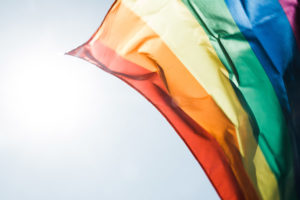Confining Change: Missed Opportunities at Nation’s Largest LGBTQ Conference
 Photo by Peter Hershey via Unsplash
Photo by Peter Hershey via Unsplash I recently had the opportunity to attend Creating Change, the largest annual LGBTQ conference in the country, hosted by the National LGBTQ Task Force since 1988. This year’s event—CC19—was held in Detroit, Michigan. I was there to support leaders of the American Humanist Association’s social justice alliances, who presented together: Diane Burkholder (LGBTQ Humanist Alliance), Tris Mamone (LGBTQ Alliance), and Ashton P. Woods (Black Humanist Alliance).
A big part of any conference like Creating Change is setting up spaces for folks from shared communities to come together to organize, support one another, and share ideas. This is done in sessions, receptions, caucuses, and more informal environments like the hotel lobby.
Recognizing that physical space, as a fixed variable, is often limited, leaders must make choices about who gets to be where and when. And how we make spaces and what spaces we make is a reflection of our values. The organizers of this conference did a lot of things right for the nearly 4,000 people in attendance. Well in advance of next year’s conference, though, we’re urging them to make some different choices when it comes to the spaces they create in order to better reflect the LGBTQ community.
At the start of their presentation about how interfaith activism can be more inclusive of humanists and the nonreligious more generally, Mamone, Woods, and Burkholder pointed to a compelling statistic from the PRRI 2016 American Values Atlas: 46 percent of LGBT Americans are religiously unaffiliated. Compared to the general population, which registers at twenty-four percent religiously unaffiliated, that’s nearly a 100 percent jump. And that makes sense; conservative religion has been consistently unwelcoming (if not brutal) to the LGBTQ community.
So, if almost half of the LGBTQ community is nonreligious, it would make sense that a healthy chunk of programming that talks about religion engages a secular or nonreligious perspective. In the faith and spirituality track at Creating Change, there were twenty-one programs ranging from Shabbat services to clergy responses in the Trump era. Of those programs, two were explicitly inclusive of nonreligious and humanist folks: the Atheist, Agnostics, Humanists and Other Nonbelievers Caucus and the aforementioned interfaith activism panel. A few more sessions were inclusive by virtue of focusing their content on countering the political maneuvering of the religious right.
Yet, overall, discussions of how to support or engage nonreligious members of the LGBTQ community were glaringly absent. “Creating change through the lens of humanism still lacks space when it comes to accommodating the secular community,” notes Woods, who chairs the Black Humanist Alliance Leadership Council. “CC19 had some really great moments, of course, BUT I feel that more space must be given to those who are secular and other groups that are part of various religions outside of the dominant religion of Christianity.”
Many of the twenty-one faith programs focused on important intersections of religion, ethnicity, class, and race. There were, rightfully, sessions on LGBTQ inclusion in Latinx faith communities and conversations on white supremacy in queer religion, but the missing sessions spoke volumes. Foremost, there were no spaces for nonreligious LGBTQ People of Color, although proposals for such spaces have been submitted. The work that should go into making space for nonreligious People of Color isn’t taken on with the same intention and rigor by the conference organizers as is done for people of faith, and that continues to be a problem.
“In a space that is designed to affirm queer people, I find it disheartening to see such lack of representation of secular-specific workshops at Creating Change,” says Burkholder, reflecting on the conference’s shortcomings as an attendee and chair of the LGBTQ Humanist Alliance Leadership Council. “Almost half of our community is nonreligious. A lack of space further silences our experiences.
We likewise need to make spaces for more humanists and nonreligious folks within the religion and faith track because, just as the track calls on people to “Practice Spirit, Do Justice,” we can’t leave social justice activism to religious communities. Doing justice extends far beyond one’s faith; it’s part and parcel of humanist values, and it’s important that religious communities make space for nonreligious folks in that activism.
There was also a noticeable lack of space for religious minorities, particularly Muslims and Jews. Though this year’s conference took place in Michigan, the state with the largest Muslim population in the country (as of the 2010 Census), there were no spaces for LGBTQ Muslims or Jews outside of a Muslim Friday Prayer gathering, one Jewish caucus event, and Shabbat dinner. The Task Force’s moratorium on Israel/Palestine discussions has seeped past conversations about foreign policy (which the Task Force explicitly states it does not engage in) and disrupted the ability for folks to come together to talk about the many other issues important to their communities here in the United States. “As secular humanists, it is our duty to ensure that we not only continue to advocate for more secular dialogue,” Burkholder adds, “but to continue holding space for tough topics, including harmful theist practices such as LGBT conversion therapy and Zionism.” If the conference is truly supposed to be a space for change, conference organizers must make spaces for conversation and dialogue.
Lastly, whether we’re talking about race, gender, class, and/or transgender experiences, the folks who are not at the center of those experiences need to sit down and shut up. Over and over again, I saw people speaking up on issues that didn’t warrant their response, particularly when it came to race and gender. On the other hand, when we recognize that there are other voices in the room that ought to be heard and we intentionally sit quietly and listen, more people are going to feel welcome in those spaces. But until then, a lot of folks are just going to stay home and stay out of the organized LGBTQ and nontheistic movements.
